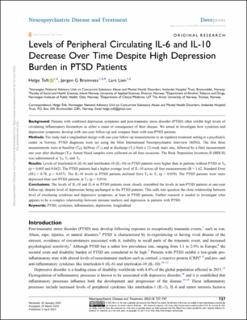Levels of Peripheral Circulating IL-6 and IL-10 Decrease Over Time Despite High Depression Burden in PTSD Patients
Peer reviewed, Journal article
Published version
Permanent lenke
https://hdl.handle.net/11250/3054593Utgivelsesdato
2022Metadata
Vis full innførselSamlinger
Sammendrag
Background: Patients with combined depression symptoms and post-traumatic stress disorder (PTSD) often exhibit high levels of circulating inflammatory biomarkers as either a cause or consequence of their disease. We aimed to investigate how cytokines and depression symptoms develop with one-year follow-up and compare them with non-PTSD patients. Methods: The study had a longitudinal design with one-year follow-up measurements in an inpatient treatment setting at a psychiatric center in Norway. PTSD diagnoses were set using the Mini International Neuropsychiatric Interview (MINI). The first three measurements were at baseline (T0), halfway (T1) and at discharge (T2) from a 12-week main stay, followed by a final measurement one year after discharge (T3). Serum blood samples were collected on all four occasions. The Beck Depression Inventory-II (BDI-II) was administered at T0, T2 and T3. Results: Levels of interleukin-6 (IL-6) and interleukin-10 (IL-10) in PTSD patients were higher than in patients without PTSD at T0 (p = 0.005 and 0.042). The PTSD patients had a higher average level of IL-10 across all four measurements (B = 1.62, Standard Error (SE) = 0.78, p = 0.037). The IL-10 levels in PTSD patients declined from T0 to T3 (p = 0.039). The PTSD patients were more depressed than non-PTSD patients at T3 (p = 0.019). Conclusions: The levels of IL-10 and IL-6 in PTSD patients more closely resembled the levels in non-PTSD patients at one-year follow-up, despite level of depression being unchanged in the PTSD patients. This calls into question the close relationship between level of circulating cytokines and depressive symptoms, at least in PTSD patients. Further research is needed to investigate what appears to be a complex relationship between immune markers and depression in patients with PTSD.

